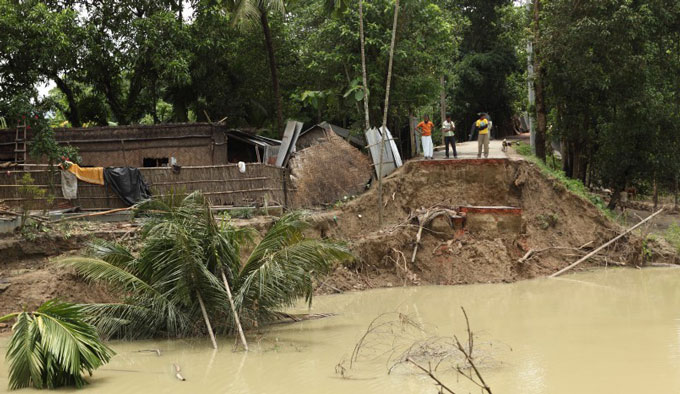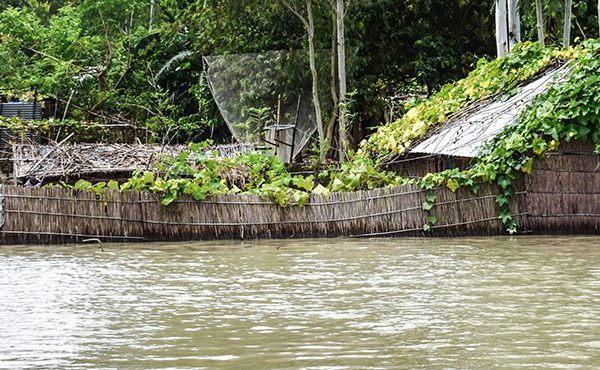Reading Time: 3 minutes
This was one of the first responses when taking an informal polling of whichever BRAC staff was unlucky enough to cross my path this week. After further prompting, the response was backed up with ‘no one really knows much about the environment, or how to be environmentally friendly’.
What does the environment mean to you?
‘Not much.’
This was one of the first responses when taking an informal polling of whichever BRAC staff was unlucky enough to cross my path this week. After further prompting, the response was backed up with ‘no one really knows much about the environment, or how to be environmentally friendly’.
Unfazed by a disappointing start, the next responses were a little more inspiring.
“Being environmentally friendly means using natural materials that can decompose and won’t harm the ecosystem”.
”The environment means trees, nature, breathing spaces and parks”.
“It’s about not throwing trash on the streets or in the rivers; reducing pollution”.
These are all great starting suggestions and since it’s the World Environment Day, here are some ideas to build on.
Firstly, why you should care about the environment:
- What goes around comes around. We depend on the environment around us to live; from the air we breathe, to the fields where we grow crops and to the water we drink – the chemicals and toxins that we pollute the earth with will eventually find its way back to us. There has been a recent spotlight in Bangladesh on chemicals which are showing up in fruits and vegetables, but air and water pollution are just as harmful to health.
- The effects of climate change are already showing – and Bangladesh will be one of the worst affected. The most recent IPCC report has shown that climate change is ‘unequivocally’ caused by humans; its effects will be felt extensively by people as well as through an increase in extreme weather events, rising temperatures and sea levels.
- Your great-grand children will thank you. The actions we take now will be felt for years to come. Nature has had thousands of years to develop and adapt to the unique set of circumstances found on this planet and any damage we cause may be irreversible. There are already several examples of permanent impacts we have had on the environment. Future generations will have to deal with the consequences of our actions (or inaction).
Fortunately, there are some small changes to our behaviour that we can all make which will help to reduce our impact on the environment.
What you can do to be more environmentally friendly:
- Find ways to reduce, reuse and recycle items you use every day. For example, try carrying a reusable bottle of water with you rather than buying several disposable ones – the plastic takes decades to decompose and can be harmful to the ecosystem. You can also try to avoid wasting paper; print less, use scrap paper and recycle whenever possible – every minute, an area the equivalent size of 36 football fields of forest is lost.
- Reduce your dependence on fossil fuels. Try walking, cycling, taking a rickshaw or the bus instead of travelling by car. The carbon dioxide emissions that are produced from fossil fuels (coal, natural gas, petrol) are directly causing climate change and polluting the air around us too. Reducing your electricity usage is important too; most of the electricity we use is ultimately produced from fossil fuels – turn off unnecessary lights and switches and reduce the use of air conditioning.
- Get planting! Growing plants and trees at home is an excellent way to take a proactive approach to being environmentally friendly. Not only do plants purify the air, they regulate the temperatures in cities (counteracting the heating effect of the concentration of concrete), produce oxygen, reduce water pollution and soil erosion and can provide a free source of food.
As an organisation, BRAC is working towards reducing its environmental impact, starting with a new Environmental Policy which will address how BRAC staff can work individually and collectively to be more environmentally friendly. Representatives from the disaster, environment and climate change programme will be visiting every programme in BRAC centre to introduce the policy and encourage people to consider the environment as part of their everyday lives.
For World Environment Day this year, let’s all take a minute to think about what the environment means to us and how we can keep working towards protecting it.
‘I alone cannot change the world, but I can cast a stone across the waters to create many ripples’ – Mother Teresa
Miriam Kennedy is a senior manager for BRAC’s disaster, environment and climate change programme in Dhaka, Bangladesh.






